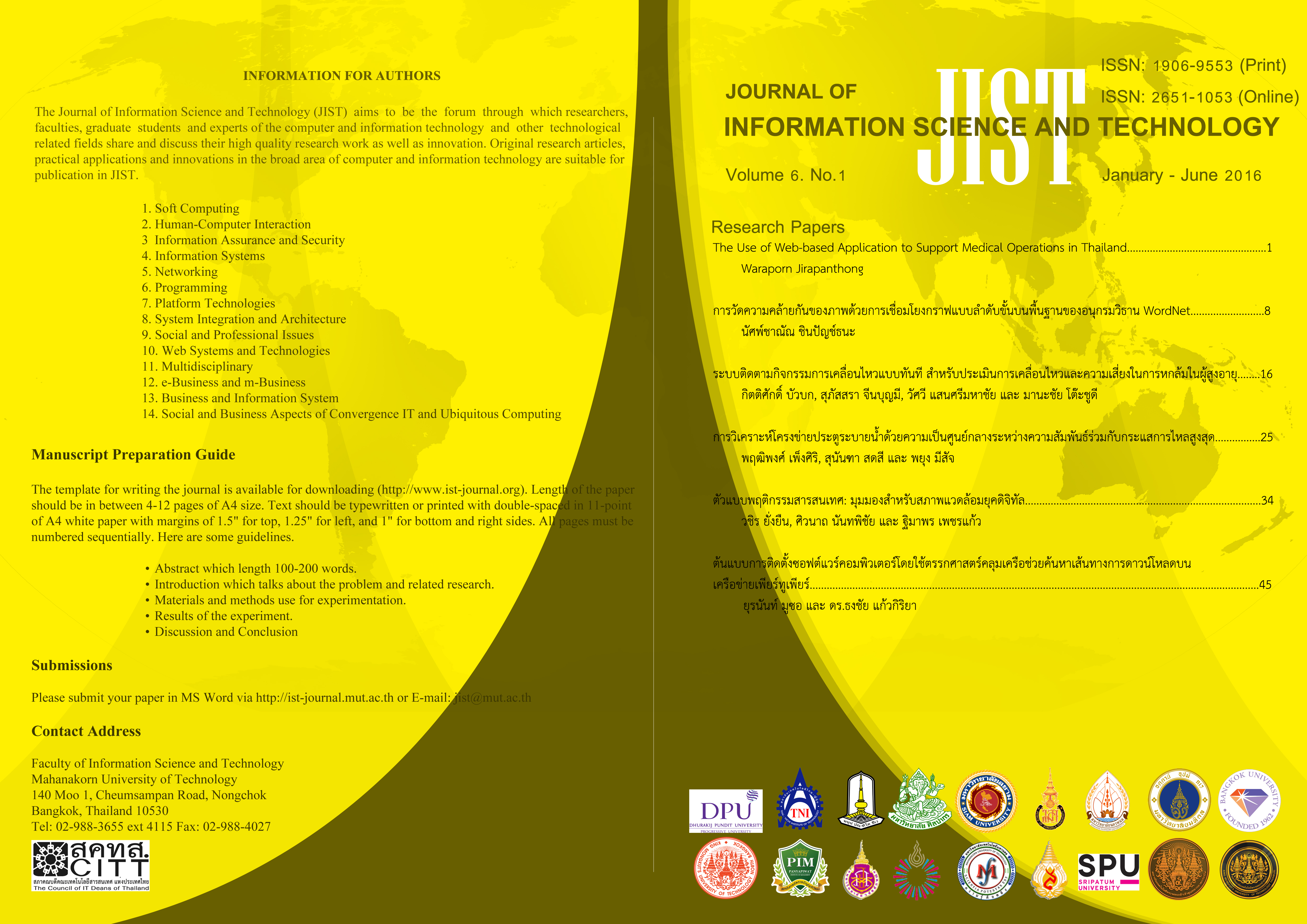Framework for Installation Software System Based on P2P By Using Fuzzy logic Download Path Selection
Main Article Content
Abstract
- Operating system installation on multiple computers is usually done by creating an image file from the server, then clients in the network download the image file for installation. This research proposes a framework for installing operating systems on multiple computers by Peer-to-Peer (P2P) connection and a Fuzzy logic algorithm. The Fuzzy logic is used for route calculations to reduce network congestion. The results show the proposed framework can reduce network congestion by 4.32% for 5 computer clients and 2.55% for 10 computer clients when compared with normal P2P downloads.
Article Details
This work is licensed under a Creative Commons Attribution-NonCommercial-NoDerivatives 4.0 International License.
I/we certify that I/we have participated sufficiently in the intellectual content, conception and design of this work or the analysis and interpretation of the data (when applicable), as well as the writing of the manuscript, to take public responsibility for it and have agreed to have my/our name listed as a contributor. I/we believe the manuscript represents valid work. Neither this manuscript nor one with substantially similar content under my/our authorship has been published or is being considered for publication elsewhere, except as described in the covering letter. I/we certify that all the data collected during the study is presented in this manuscript and no data from the study has been or will be published separately. I/we attest that, if requested by the editors, I/we will provide the data/information or will cooperate fully in obtaining and providing the data/information on which the manuscript is based, for examination by the editors or their assignees. Financial interests, direct or indirect, that exist or may be perceived to exist for individual contributors in connection with the content of this paper have been disclosed in the cover letter. Sources of outside support of the project are named in the cover letter.
I/We hereby transfer(s), assign(s), or otherwise convey(s) all copyright ownership, including any and all rights incidental thereto, exclusively to the Journal, in the event that such work is published by the Journal. The Journal shall own the work, including 1) copyright; 2) the right to grant permission to republish the article in whole or in part, with or without fee; 3) the right to produce preprints or reprints and translate into languages other than English for sale or free distribution; and 4) the right to republish the work in a collection of articles in any other mechanical or electronic format.
We give the rights to the corresponding author to make necessary changes as per the request of the journal, do the rest of the correspondence on our behalf and he/she will act as the guarantor for the manuscript on our behalf.
All persons who have made substantial contributions to the work reported in the manuscript, but who are not contributors, are named in the Acknowledgment and have given me/us their written permission to be named. If I/we do not include an Acknowledgment that means I/we have not received substantial contributions from non-contributors and no contributor has been omitted.
References
2. เจษฎา วิณโรจน์, “Peer-to-Peer Network,” [Online]. Available : https://sites.google.com/site/jesadawin/pheiyr-thu-pheiyr-peer-to-peer-network. [Accessed : 2 สิงหาคม 2559]
3. พยุง มีสัจ, ระบบฟัซซี่และโครงข่ายประสาทเทียม, กรุงเทพฯ : คณะ เทคโนโลยีสารสนเทศ (มจพ), 2559
4. กิติศักดิ์ วัฒนกุล, “การกระจายไฟล์ข้อมูลสำหรับการเรียนการสอนด้วยสื่ออิเล็กทรอนิกส์ภายในเครือข่ายคอมพิวเตอร์แบบเพียร์ทูเพียร์,” วิทยานิพนธ์ วศ.ม. (วิศวกรรมคอมพิวเตอร์), มหาวิทยาลัยสงขลานครินทร์, สงขลา, 2553
5. วีรชัย แย้มขจี, “การศึกษาโพรโตคอลค้นหาเส้นทางบนเครือข่ายไร้สายเฉพาะกิจแบบเคลื่อนที่ได้ด้วยตรรกศาสตร์คลุมเครือ,” วิทยานิพนธ์ วศ.ม. (วิศวกรรมไฟฟ้า), มหาวิทยาลัยเทคโนโลยีราชมงคลธัญบุรี, ปทุมธานี, 2555
6. A. Mahapatra et al., “A fuzzy approach for reputation management in bittorrent p2p network,” International Conference on Electronics Computer Technology, ICECT 2011, Kanyakumari, India, April 8-10 2011. pp. 360-365
7. A. Mahapatra et al., “A fuzzy approach for reputation management in online communities for bittorrent p2p network,” International Journal of Computer Science and Information Technologies, Vol. 2, No. 3, July 2011. pp. 1564-1568
8. A. Mahapatra and N. Tarasia, “A fuzzy approach for reputation management for reputation management using voting scheme in bittorrent p2p network,” International Journal of Computer Science and Information Technologies, Vol. 2, No. 2, July 2011. pp. 735-740
9. S. N. Ingoley and M. Nashipudi, “A review: fuzzy logic in congestion control of computer network,” International Conference in Recent Trends in Information Technology and Computer Science, ICRTTTCS 2012, Chennai, India, April 19-21 2012. pp. 975-981
10. B. S. Kiruthika Devi et al., “A novel fuzzy congestion control algorithm for router buffers,” IEEE-International Conference on Recent Trends in Information Technology, ICRTIT 2011, Chennai, India, June 3-5 2011. pp. 423-427
11. R. Lal and A. Chiou, “Computational intelligence utilisation in simulation of congestion control in TCP/IP edge network,” Fourth International Conference on Network and System Security, NSS 2010, Melbourne, Australia, September 1-3 2010. pp. 191-198
12. B. Safaiezadeh et al., “A new fuzzy congestion control algorithm in computer networks,” International Conference Computer and Communication, ICFCC 2009, San Francisco, USA, August 3-6 2009. pp. 314-318



